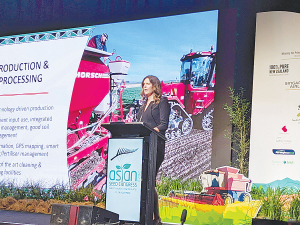Billed as the largest seed industry event in the world, the for-members and by-invitationonly event is organised by the Asia and Pacific Seed Association (APSA). This was established in 1994 to promote quality seed production and marketing in the Asia and Pacific Region.
APSA president Dr Manish Patel called it a unique forum that brings together some of the best and brightest to brainstorm, plan, collaborate and mitigate the multitude of challenges for the greater Asia-Pacific seed industry.
Major topics included: Essentially Derived Varieties (EDV), which refers to plant varieties that are derived from others (thus carrying implications for crop seed intellectual property); modern crop cultivation techniques and technologies; the evolution of plant variety protection laws and regulatory oversight of genome-edited product.
This was the first time the congress has been held in New Zealand and only the second time outside Asia. It was co-hosted by the Ministry for Primary Industries (MPI) and the New Zealand Grain and Seed Trade Association (NSGSTA).
NSGSTA president Charlotte Connoley told delegates at the opening that Canterbury was an appropriate host, representing more than 80% of New Zealand’s seed production from 44,000ha.
“That expense of land has enabled the implementation of isolation distances to achieve genetic purity, and the fertile river plains are ideally suited for the production of high value seed,” she said.
Exporting to over 70 countries, New Zealand seed exports totalled $221 million in 2022. “New Zealand seed multipliers are known globally for the quality of seed that is produced and the integrity and traceability of the systems the seed is grown within,” Connoley added.
“New Zealand offers a great opportunity for counter-season production of temperate seed species and our pastoralbased agricultural system is recognized worldwide for its efficiency, innovation and sustainability.”
MPI’s chief science Adviser John Roche told the congress that for the first time in human history there is no more land available for food production.
“In fact, we may have overstepped nature’s boundaries and may have to relinquish some of the land we put in agricultural production in some parts of the world.”
Speaking at the opening of the Asian Seed Congress, Roche outlined the challenges facing global food production.
He said all historic mobility rests on the possession and use of land.
“Since the first man, or most likely a woman, scratched the surface with a stick to plant the first wild grass seeds, farmers have underpinned civilization.”
However, the world must now produce as much food in the next 30 years as it did in the last 2000.
“With another two billion people expected over the next 30 years or so, we are not yet achieving the UN sustainability goals of zero hunger and poverty,” he explained.
“Approximately three billion people around the world cannot regularly afford a healthy diet, with nearly a billion of them without the nutrients necessary for life. Almost half of all children and two-thirds of young women are deficient in at least one micronutrient globally.”
Roche says it is for these reasons that this work is so important.
He added that, just as science-led innovation in the seed industry stabilized food production in much of the world in the 1960s, it must lift again to meet new challenges.
Climate change is making food production more difficult, with many experts predicting large decreases in yields in a warmer world. More research was needed to develop drought, heat and even flood resistant crops.
Other challenges are an increasingly difficult trade environment and the expectations of consumers, who have never cared more about how their food is produced.
“They’re putting increased pressure on our farmers and growers to remove chemicals from the food system, farm more organically, to reduce their environmental footprint – all noble gestures,” said Roche.
“We must better engage with our consumers to give them confidence in how we produce our food.”
Valuable at Home and Abroad
Roche says the New Zealand seed industry was an incredibly important part of our agricultural success story.
Not only does New Zealand export more than $250 million worth of seed each year, but our pastoral and arable sectors are hugely dependent on the improved varieties and species available to them.
“We are very proud of our domestic production here in New Zealand. Our farmers produce approximately 60% of the world’s radish seed and 40% of the world’s carrot seed. We produce 50% of the world’s white clover seed, enough to sow between half a million and a million hectares each year.”
This was in addition to the grains, the oil seeds, pulses and other crops, Roche added.
“These are very nice figures that show the importance of our seed industry, not only for our local and national economies, but to global food security. Most importantly to the healthy nutrition outcomes we strive for globally.”

















